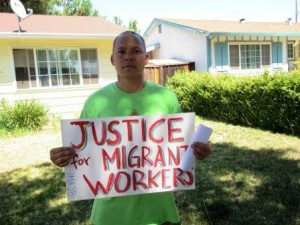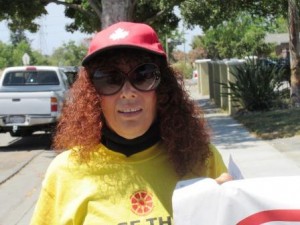Protesters hit San Jose care home’s refusal to pay unpaid wages
SAN JOSE, California – More than 50 activists last August 22 protested in front of a Filipino-owned care home in an attempt to make it pay $83,846 in unpaid wages to two of its former employees, as ordered by the California Labor Commission.
The protesters, members of a coalition led by the Pilipino Association of Workers and Immigrants – Silicon Valley (PAWIS-SV), arrived at the 2882 Scottsdale Avenue address of the Bayview Care Home only to find it shuttered and with no vehicle in the driveway. However, a disabled elderly person was seen being helped into a para-transit SUV at the curb just 30 minutes before the rally.
PAWIS President Michael Dalupo asked that the names and photos of the former employees not be released alleging that the industry blackballs whistleblowers.
The activists distributed copies of their statement to make the neighborhood aware of the wage theft judgment on Bayview.
Abusive owner
One of the former Bayview employees told INQUIRER.net that they filed the case jointly near the end of 2012. It took about seven months of investigation. At a court hearing in early 2013, a letter written by the Labor Commission ordered Bayview owner, Lolita Bautista. to pay back wages due. But until now, “We haven’t seen a dime of it.”
The 31-year-old caregiver is owed $53,154.39. He said he worked as a live-in caregiver for more than eight hours a day for almost eight years. He was “not given any meal time breaks.” He also heard Bautista tell the other caregivers, “I don’t want to pay.”
The other caregiver is 53 years old and is owed $25,693.29. She said her sister brought her to Bayview at a time when Bautista could find no worker. When she told Bautista she could not leave her five-year-old daughter, Bautista allegedly told her not to worry because they could stay in the facility for free. But later, Bautista allegedly charged her for water and electric consumption, and mother and daughter had to room with a relative of Bautista.
But a coalition leader said, “The law states that unless you have a written agreement, you can’t subtract the rent, and the amount that you subtract is set by law. It’s very, very small. You can’t subtract the full amount of the paycheck.”
When she asked Bautista for a rental invoice as her lawyer advised, Bautista reportedly told her she was exaggerating their mutual understanding. Bautista would also instruct the worker to say she was not around when nurses and nutritionists called to collect their bills.
Bautista allegedly told the caregivers that they were paid to take responsibility even for things they didn’t do. So, when Bautista’s relative inflicted violence on a client, the worker had to say it was her doing. She claimed this led to her firing in April of 2012. Bautista allegedly promised to place her at another job but it didn’t happen and her replacement arrived when she was still working.
The caregiver also alleged that they would get their paycheck regularly on the 15th, but they were usually told to cash it three or five days after. The 53-year-old worker added, “Even if you acquired more pay because of overtime work, Bautista always found ways to bring it down to $50 a day.”
She believes Bautista could afford to pay her because Bautista owns a house in the Yerba Buena Hills and sold her Las Vegas house to her sister a while back. She also said Bautista owns two more care homes – Baymill 1 at Danderhall and Baymill 2 at McLaughlin. Usually, she said, if there was no caregiver at Baymill 1, she would be taken there to pick up the slack and work without a break for the whole month when the other caregiver went on vacation.
Hot beds of wage theft
Supervising Attorney for the Workers’ Rights Clinic of the Katherine and George Alexander Community Law Center and Ruth Silver-Taube, coordinator of the Wage Theft Coalition, confirmed the abuses occurring at other care homes reported by both Bayview ex-employees.
Silver-Taube explained, “Bayview hides under a shell corporation. It declared bankruptcy and transferred its assets to another entity. Even though it does not exist in the books, the owner now operates a new company, the same owner that continues to steal from workers.”
“We decided to target care homes now because it is the hot bed of wage theft. It is rampant in the industry. We see a lot of retaliation that’s immigration-related. The care home owner will threaten workers, documented or not that they will call ICE and the police.” Many undocumented caregivers are then paralyzed into helplessness even though resources and free information abound.
She also said there are very strict penalties that people don’t know about when abuse of an undocumented immigrant happens. A business can get its license suspended. Any lawyer who writes threatening letters can be disbarred. There are also monetary penalties against threats.
The law protects undocumented workers, said Silver-Taub. “No one asks immigration status. The Labor Commission does not ask. None of the other government agency asks. There’s a state statute that says you’re not allowed to ask in a lawsuit about immigration status.”
“The only thing that an undocumented can’t do is apply for unemployment because you have to swear you can work legally. They can get worker’s comp, state disability. They can go to the Labor Commission, the Equal Employment Opportunity Commission and to the Department of Fair Employment & Housing,” Silver-Taub explained .
Human trafficking is also rampant in care homes, activists claim. The workers are often abused, are not free to leave and are told they are indebted to the owners “who brought them here.”
Unfortunately, Silver-Taube said, “The law doesn’t have teeth. If you file a case against someone and you win, neither the courts nor the Labor Commission collect. You need to find a lawyer who will take 40 percent and who may not even accept the case if it’s below a certain amount. So there’s a culture of non-compliance.”
Successful collection
In January this year, eight care homes were docketed at the Santa Clara County Superior Court, owing from about $4,000 to $136,000.
Michael Tayag, PAWIS education officer said, “There are certainly cases of accused care home owners who are not Filipino, but in PAWIS’ experience, all cases against home care owners that our members have filed have been Filipinos. I want to emphasize that while wage theft has a huge impact on Filipino workers in the health care industry, it is an issue that affects all workers in all industries, of all races and religions.”
Some caregivers who sought the organization’s help have seen their wage theft cases paid or resolved. Among those who won sizable amounts were Nelly Gonzales, for about $100.000 in 2012, and Prisicilla Soriano for about $64,000 this year.
San Jose office of the California Labor Commission handles approximately 300 enforcement claims from workers in Santa Clara County every month, according to Tayag. From 2012 to 2013, the nearly 2,000 workers who filed claims with this office were awarded $8 million in owed wages. This is an average of almost $5,000 per worker, which amounts to approximately a quarter of the income they earn in a year.
Tayag admitted that San Francisco authorities have had more success in going after wage theft cases. But this year, the Wage Theft Coalition persuaded the San Jose City Council to prioritize wage theft.
Silver-Taube also cited SB588 in Sacrament with pro tem Democrat for State Senator Kevin de Leon. It would require deadbeat employers to pay the judgement or post a bond or else the Labor Commission would file a lien on their property.
The bill would also ensure that the responsible party couldn’t hide through corporate name changes and sub-contractors. It would also empower the Labor Commission to collect for the worker, collect by mail, or seize an employer’s property.
Silver-Taube said, “We are advocating that, on top of direct action, we want counties and cities to be able to revoke or suspend permits. This will make a difference. They do it in Houston, Dade, Miami, Seattle, San Francisco and now in Los Angeles.”
In January this year, the Wage Theft Coalition targeted Crazy Buffet along Stevens Creek Boulevard and helped food-servers. Silver-Taube said, “There were 21 judgments against them and they owed $1.6million in citations. They eventually closed, but we hear they may re-open again.”
Like us on Facebook



